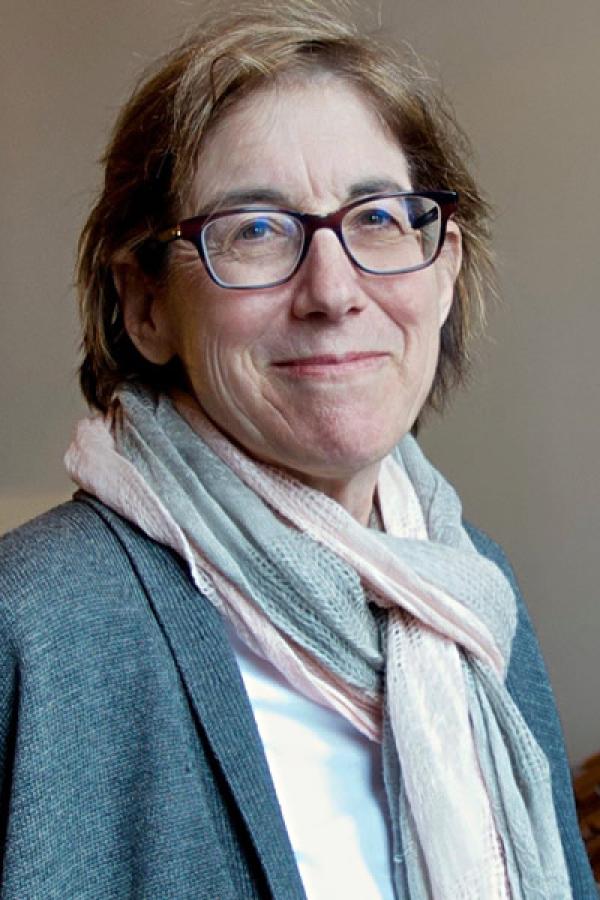Christina E. Kramer

Photo by Diana Tyszko
Bio
Christina E. Kramer is a professor in the department of Slavic languages and literatures at the University of Toronto, Canada. She has published numerous articles relating to Balkan linguistics and a Macedonian grammar (University of Wisconsin Press). She is currently writing a book about postcard images of Skopje. She has translated a number of novels, including A Spare Life by Lidija Dimkovska (Two Lines Press, long-listed for Best Translated Book of the year), Freud's Sister by Goce Smilevski (Penguin Books, 2012, Lois Roth Prize Honorable Mention), and three novels by Luan Starova: My Father's Books; The Time of the Goats (University of Wisconsin Press, 2012;, and The Path of the Eels (supported by an NEA grant; Autumn Hill Books).
I love working with living authors. My translation work with Lidija Dimkovska has involved a number of face-to-face meetings, and the National Endowment for the Arts grant allows me to travel to Slovenia and Macedonia to consult with her. This particular novel, with its discussion of the rise of neo-Nazism and Fascism, the different lives women live, and the deep attachment of characters to language and place, has particular resonance for me. The NEA grant helps authors and translators gain recognition for their work and I am honored to be among the recipients.
7 June 2009, Castellammare del Golfo by Lidija Dimkovska
[Translated from the Macedonian]
While she was alive, Grandma Nedjeljka remembered everything, events of the past and everyday events up through June 2009. Or, more exactly up to June 7, 2009. Up to that date, up to my 21st birthday, she was still a normal grandmother, mother, and mother-in-law. Old, but normal. Very old, but vital. Grandma and her brother evidently had their mother’s genes and could expect to live to 90. I was turning the age considered a legal adult in America. The orange tree was blossoming and we were sitting beneath it at the wooden table. I was sitting with mama, papa, Margherita, and her boyfriend—a serious boyfriend—Pietro. He was a full 20 years older than Margherita. She was 18, he was 38. A very pleasant and open guy, but too old! “He’s so old, where did you possibly find him!” grandma would say whenever he left our place. “Magi’s a child, he’s an old man!” And she never missed the opportunity to turn to father and say: “Find Margherita a proper suitor! A young girl shouldn’t be going around with an old man!” But for papa it was even more unpleasant what Margherita dished back: she would laugh and say, “He’s young, don’t worry!” and papa would feel guilty that Margherita had found herself such an old boyfriend. Still, once he even said, “I guess better old than nothing,” probably alluding to me who, at 21 years of age, had yet to bring a young man home. Margherita had joked with me that day: “Well, now that Neda is ‘forever young’, she doesn't need a man.” “Which Neda?” Grandma asked and we all laughed. “You,” I said to her devilishly, although everyone yelled, “Neda, not you, you’re 86 years old, Neda’s only 21. And, you’re Nedjeljka, Grandma Non-Oui.” And then, as I recall, grandma started shouting: “I’m 21 years old, I’m Neda, and today is my birthday!” “But grandma,” I said trying to calm her, but she screamed at me, “Grandma?! What do you mean, grandma? I’m a young woman, I’m 21 years old, my name is Neda, my mother has a stand in the market, my father is a fisherman, we live in Split.” “Of course, of course, that’s nice, mama,” our father said trying to smooth things over, but she started in on him, too: “Mama? What do you mean ‘mama? I am a young woman and I’m not married. Carlo is waiting for me on the Riva!” How strange my birthday was! At first we thought grandma was joking and that we were joking with her, but she wouldn’t let up and kept trying to convince us that she was the Neda celebrating her birthday, not me. When she couldn’t convince us, she began to shout at the top of her lungs and called us liars, thieves, even fascists. We quickly cleared the dishes and the food from the table in the garden and managed somehow to get her inside. The special Split cake that grandma had made the day before—working all day in the kitchen, her spattered recipe in front of her—remained in the small refrigerator that grandpa had put in the corner of the garden several years before. No one remembered it until several days after my birthday. I think all of us felt our hearts pounding in our temples. We went inside, closed the door that led to the garden, and shuffled off to our own rooms. Grandma went to her own room as well, repeating over and over as she climbed the stairs: “Faa-scists. Faa-scists!“
About Lidija Dimkovska
Lidija Dimkovska is a poet, novelist, essayist, and translator. She has published six books of poetry, three novels, and an American diary. Her work has been translated into more than 20 languages. She has received numerous literary awards. Her first two novels Hidden Camera (2004) and A Spare Life (2012) were both named best prose book of the year by the Writers’ Union of Macedonia. Her novel A Spare Life also received the European Union Prize for Literature (2013). Her third novel Non-Oui was shortlisted for the Macedonian best prose book award and for the international literary award Balkanika.

